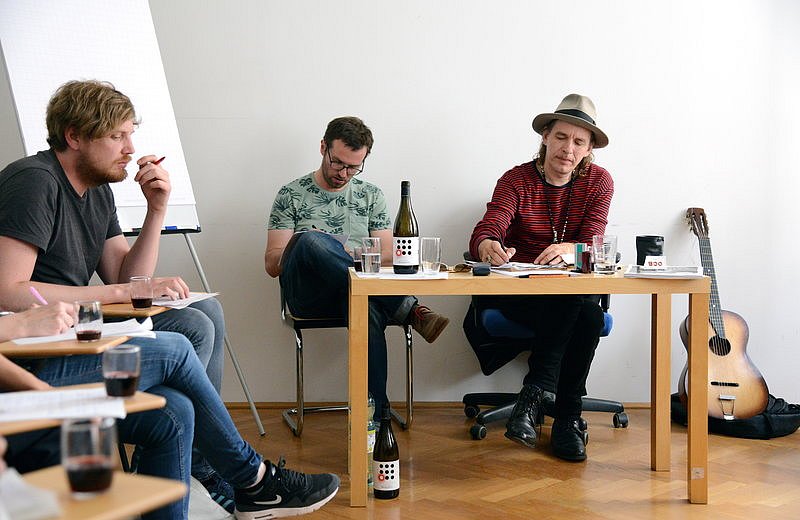Wine and Poetry
Written by Franz Weninger on the 23rd of May 2019After setting my vineyard sites to music, see Sound of Terroir, I wanted to feel if wine would not be better described through poetry. Since the principal of the Viennese “School of Poetry”, Fritz Ostermayer, is a friend of mine, I started a conversation about this with him. He suggested organising a “Writing and Drinking Workshop”, facilitated by Ernst Molden, a songwriter, author and friend of wine. When I stepped into the classroom, I was particularly glad to see Nino from Vienna. I think he is a brilliant songwriter who manages to bring his emotions into lyrics.
Journalist Johann Werfring wrote the following article about the workshop:
The idea of this vinophiliac inspiration in Vienna came from talented Winemaker Franz Reinhard Weninger from Horitschon, Central Burgenland. The stereotypical approach to wine in the form of reviews and points has been around for many years but is too one-dimensional, according to Weninger. After already having connected wine with music in a special way, he has now found a kindred spirit in the Viennese author and musician Ernst Molden in a project to explore the creative process of writing in combination with his wines.
After the Viennese “School of Poetry” advertised this “Writing and Drinking Workshop” with the theme “Writing Wines – the Intoxication of Poetry, the Poetry of Intoxication”, the event was fully booked within a short amount of time. Part of the event took place directly in the “School of Poetry” classrooms in Vienna’s Mariahilfer Street, and some of it was held out in the open.
Based on the hypothesis that wine leads to a loss of control sooner or later and that poets actually strive to let go of control, Ernst Molden encouraged the participants to find out for themselves how fruitful or unfruitful this alcohol-driven loss of control would be for producing literature. Each day, the writing process was accompanied by various wines from Franz Reinhard Weninger’s cellar.

After a warm-up round, where participants first composed and then presented four-line poems about their state of mind before and after enjoying the wine, the poets were asked to note down adjectives about the wine they had just drunk. “I would like to arrive at a new wine terminology as a product of this class,” instructed Molden. At this point it is important to note that, with the exception of one female participant who worked in the field of wine, none of the “pupils” were wine connoisseurs, they only had a personal appreciation for wine. The adjectives had to describe a 2013 Blaufränkisch with 12.5 % vol. alcohol, served in the small glasses that were typically used in taverns back in the day.
And indeed, participants came up with relatively original, definitely comprehensible and partly quite apt descriptive epithets for Weninger’s creation. Some were emotion-based descriptions such as
"herzerwärmend", "ehrlich", "freundlich", "ich-erlöst", "blutig" oder "fröhlich",
„heart-warming“, „honest“, „friendly“, „self-liberated”, “bloody” or “cheerful”,
whereas others were direct sensorial experiences such as “strong”, “flowing” (= the wine drinks easily), “silky”, “earthy”, “gentle” or “salty” – just as they often occur in the usual wine tasting terminology. The characterisation “brushed against the grain” very clearly referred to the grippy tannins of the classic Blaufränkisch. Of course, it should be noted here that drinking out of old-fashioned mini glasses (where the aromas quickly dissipate) evokes a much less “wine-like” perception than would have been the case with high-quality wine glasses which function similarly to a chimney, directing the bouquet towards the nose.
Is there such a thing as an intoxication being?
Various exercises with various themes followed. Participants had to compose a text about an “intoxicater” or about the wine they had just consumed. The results of this literary exercise would be presented straight away. One of the participants pointedly expressed that he experienced the Blaufränkisch as a “calm swarm of bees in the mouth”, once again referring to the mouthfeel caused by the tannins. Intoxication as a being was discussed, where questions such as “Is there such a thing as an intoxication being?” and “Did you find a better version of yourself in intoxication?” were raised. With his comments, Franz Reinhard Weninger acted repeatedly as initiator and at times he took part in the writing process.
The production of texts continued in much the same way over the two following days. Participants were also challenged multiple times to write wine stanzas, which they would then perform with Ernst Molden accompanying them on the guitar in three-four time. As Molden reported, he actually found the three-four time signature to be the “rhythm of intoxication”.
All in all it was, from a literary point of view, a very ambitious group. Everyone was very attentive with Ernst, there was an atmosphere of mutual benevolence, and also the feedback from the event facilitators was always appreciative. The literary afternoon on the Prater Park’s lawns was deemed especially relaxing by everyone involved.
The legendary coffee shop “Urania” in Radetzky Street in the Wien-Landstraße district, where the final workshop presentations took place, was full to the brim. In the audience as well as among the participants, the mood was fantastic. Of course it was impossible to magically create a class full of poets in three days, but the level was overall good, with a few creations even displaying impressive format. The event ended on a decidedly witty note, with a musically accompanied reading of Harald Jöllinger’s dialect-dusted wine stanza: "Die Maounna san grantig / die Weiwa san zänkisch / drum saufen wir täglich / drei Liter Blaufränkisch" (which translates roughly to “The men are grumpy / the wives are naggish / so each day we down / three litres Blaufränkisch”).
Print article published on 11 September 2015, © Johann Werfring
In: "Wiener Zeitung", "Wiener Journal" Supplement, S. 30–31